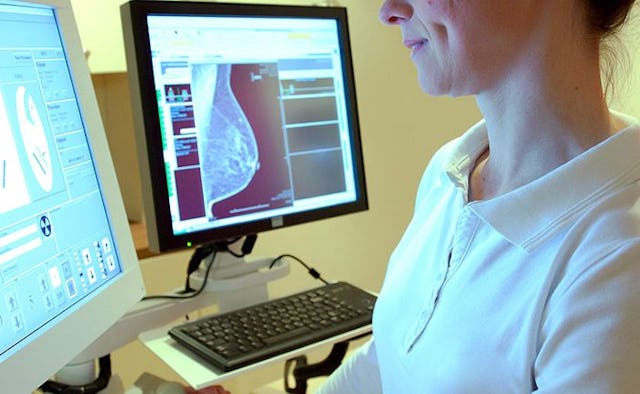The Bad Mammogram Survival Guide

But I wouldn’t know that for several weeks after I got a phone call from the lab informing me of a troubling result from my first mammogram. I was holding my 3-month-old daughter, asking the determinedly neutral-voiced woman on the other end of the line if this was really happening, and then if she could perhaps assure me that everything would turn out alright in the end. Her answers, like the ones to most big questions in life, were Yes, No, and Try Not to Worry Too Much.
I went back for a second mammogram, which then led to an ultrasound, which then landed me in a soothingly lit, blandly decorated private waiting room. The walls pressed in on me when the radiologist and a caseworker joined me. This conversation was sensitive enough to demand two professionals in the room, like the emotional equivalent of a pap smear. The doctor sat down on an ottoman and scooted towards me. I waited for Enya or the sounds of a thunderstorm to be piped into the room at low volume.
My doctor started talking in jargon, about two spots on my scans that could be evidence of invasive ductal carcinoma. I didn’t know what this meant, but it sounded bad.
“You seem really nervous!” I blurted out, which caused him to blush so deeply that I felt protective of him.
“I’m not nervous!” he said.
“Well then I’m nervous! I’m not sure what you’re saying. On a scale of 1 to 10, how fucked am I?”
This caused the caseworker to burst into laughter that she immediately apologized for and the poor doc to blush harder.
“1, 2, as in, as you say, not very fucked,” the doctor said.
“And if it were the worst case scenario,” I demanded, “how bad would that be do you think? Are we thinking Stage 2?”
The kind man seemed to be thrown off his game by my direct questions, which is perhaps why he gave me actual answers.
“I’m thinking Stage 1, even Stage 0.”
“You should have opened with that!”
The three of us went on to have some laughs while we scheduled my double biopsy appointment. I asked if I could bring a mix—hardcore rap if they were down—to listen to during the procedure and they agreed, wrongly assuming I meant with ear buds.
A biopsy is a bit like taking your Subaru in for a Jiffy Lube appointment. You lie on a plastic bed with your tit in a hole and the bed is cranked high up into the air so the doctor and nurse can work under you. I’m the type of person who needs to spaz out before a procedure, cracking manic jokes and asking lots of dizzy questions, and then tune out completely. I put my iPod next to my head on the table and turned up the volume high. I told the magnificent nurse I’d like for her to quietly narrate the big moments of the procedure but otherwise leave me alone.
I closed my eyes, the good doctor did his work to the rhythm of Nicki Minaj’s “Anaconda,” and the nurse kindly squeezed my arm at the brief and uncomfortable moments of incision. Afterwards they let me take pictures of the sealed cups of questionable matter the doctor had sucked from two areas of my left breast. Looked like mouse brains.
I went home and fed my baby, believing that no matter what I wasn’t going to die. At least not from ductal carcinoma, at least not before she started walking. And within four business days I was told that I don’t have early stage breast cancer. In the end my first mammogram was an expensive, stressful reminder that I’m of the age when phone calls come bearing messages of troubling lab results. But I take enormous comfort in the fact that I can be trusted to try and make doctors speak to me in language I understand, and that there is a suitably inappropriate mix tape to keep a person company through every medical emergency.
This article was originally published on